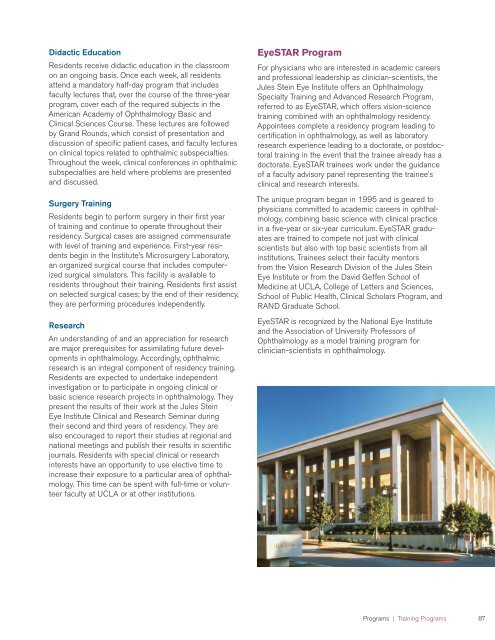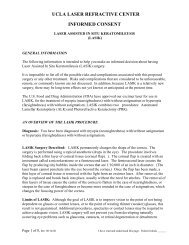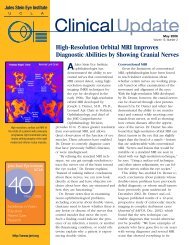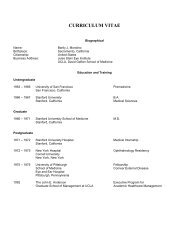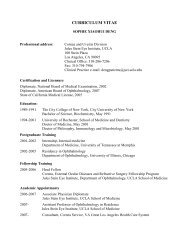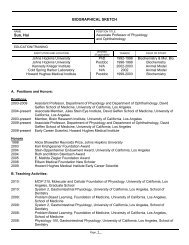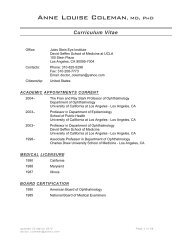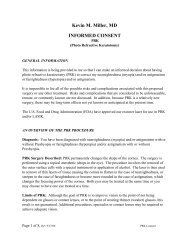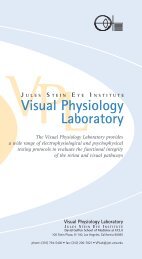View Annual Report - Jules Stein Eye Institute
View Annual Report - Jules Stein Eye Institute
View Annual Report - Jules Stein Eye Institute
Create successful ePaper yourself
Turn your PDF publications into a flip-book with our unique Google optimized e-Paper software.
Didactic Education<br />
Residents receive didactic education in the classroom<br />
on an ongoing basis. Once each week, all residents<br />
attend a mandatory half-day program that includes<br />
faculty lectures that, over the course of the three-year<br />
program, cover each of the required subjects in the<br />
American Academy of Ophthalmology Basic and<br />
Clinical Sciences Course. These lectures are followed<br />
by Grand Rounds, which consist of presentation and<br />
discussion of specific patient cases, and faculty lectures<br />
on clinical topics related to ophthalmic subspecialties.<br />
Throughout the week, clinical conferences in ophthalmic<br />
subspecialties are held where problems are presented<br />
and discussed.<br />
Surgery Training<br />
Residents begin to perform surgery in their first year<br />
of training and continue to operate throughout their<br />
residency. Surgical cases are assigned commensurate<br />
with level of training and experience. First-year residents<br />
begin in the <strong>Institute</strong>’s Microsurgery Laboratory,<br />
an organized surgical course that includes computerized<br />
surgical simulators. This facility is available to<br />
residents throughout their training. Residents first assist<br />
on selected surgical cases; by the end of their residency,<br />
they are performing procedures independently.<br />
Research<br />
An understanding of and an appreciation for research<br />
are major prerequisites for assimilating future developments<br />
in ophthalmology. Accordingly, ophthalmic<br />
research is an integral component of residency training.<br />
Residents are expected to undertake independent<br />
investigation or to participate in ongoing clinical or<br />
basic science research projects in ophthalmology. They<br />
present the results of their work at the <strong>Jules</strong> <strong>Stein</strong><br />
<strong>Eye</strong> <strong>Institute</strong> Clinical and Research Seminar during<br />
their second and third years of residency. They are<br />
also encouraged to report their studies at regional and<br />
national meetings and publish their results in scientific<br />
journals. Residents with special clinical or research<br />
interests have an opportunity to use elective time to<br />
increase their exposure to a particular area of ophthalmology.<br />
This time can be spent with full-time or volunteer<br />
faculty at UCLA or at other institutions.<br />
<strong>Eye</strong>STAR Program<br />
For physicians who are interested in academic careers<br />
and professional leadership as clinician-scientists, the<br />
<strong>Jules</strong> <strong>Stein</strong> <strong>Eye</strong> <strong>Institute</strong> offers an Ophthalmology<br />
Specialty Training and Advanced Research Program,<br />
referred to as <strong>Eye</strong>STAR, which offers vision-science<br />
training combined with an ophthalmology residency.<br />
Appointees complete a residency program leading to<br />
certification in ophthalmology, as well as laboratory<br />
research experience leading to a doctorate, or postdoctoral<br />
training in the event that the trainee already has a<br />
doctorate. <strong>Eye</strong>STAR trainees work under the guidance<br />
of a faculty advisory panel representing the trainee’s<br />
clinical and research interests.<br />
The unique program began in 1995 and is geared to<br />
physicians committed to academic careers in ophthalmology,<br />
combining basic science with clinical practice<br />
in a five-year or six-year curriculum. <strong>Eye</strong>STAR graduates<br />
are trained to compete not just with clinical<br />
scientists but also with top basic scientists from all<br />
institutions. Trainees select their faculty mentors<br />
from the Vision Research Division of the <strong>Jules</strong> <strong>Stein</strong><br />
<strong>Eye</strong> <strong>Institute</strong> or from the David Geffen School of<br />
Medicine at UCLA, College of Letters and Sciences,<br />
School of Public Health, Clinical Scholars Program, and<br />
RAND Graduate School.<br />
<strong>Eye</strong>STAR is recognized by the National <strong>Eye</strong> <strong>Institute</strong><br />
and the Association of University Professors of<br />
Ophthalmology as a model training program for<br />
clinician-scientists in ophthalmology.<br />
Programs | Training Programs 87


